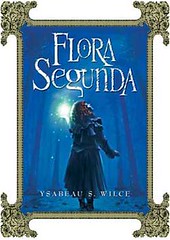I really hate it when characters get off scot-free--when at the end of each episode or book, it feels like they are reset back to where they started, off the hook. The X-Files fell into this trap, after a while; Mulder and Scully never seemed to learn anything or deal with any of the horrible things that happened to them. This lack of consequence made Mulder and Scully look like cardboard characters--which, indeed, they ended up being. (I knew the show had lost me when the fan-fic was better than the show itself!) Buffy the Vampire Slayer was much much better about dealing with consequences; the mighty Joss Whedon never let his people off the hook. If they screwed up, it always came back to bite them. Sometimes literally! In books, consider Dorothy Dunnett's Chronicles of Lymond (my favourite book series ever)--Lymond is all about the Consequences--they (and their henchmen Guilt and Self-Hatred) are the engine that drives his every move.
Consequences are something that I really wanted to stress in Flora Segunda. Flora makes some bad decisions and they come back to haunt her. In fact, in a way, one of the themes of the book is that being an adult means facing up to the consequences of your actions. And she's not the only one who is having to deal with that issue. Buck and Hotspur have their baggage, even if Flora doesn't fully understand what that baggage is. Even Valefor is paying for something that he did (which we'll find out more about that in Flora Redux). All of them made choices, at various points in their lives, and these choices now drive their lives--and the lives of those around them, too.
(Slight Spoiler Ahead)
It was extremely tempting to have Flora Segunda end on a happy note; everyone reconciled and All Made Up. And, of course, if you don't give the reader some sort of resolution, then the whole book can seem an unsatisfactory cheat. As humans, we want a happy ending--that's one of the reasons we read fiction to begin with. But as an author you want to be true to the characters, and so sometimes that means that you can only give the reader hope of a happy ending, rather than a happy ending itself. So that's how I went--it would be untrue to Buck, Flora, & Hotspur to have them change in a second--can any of us change so quickly? But we can want to change, and hope that can we do so, and maybe we can rise about our issues and end up happy, or maybe we shall sink under them, and drown.
But in the end, the important thing is that we face those issues, and that's why I like tv shows and books that explore what happens after you make your decisions--and plays out if those decisions were wise or not. In my own work, it would be a cheat to do anything else. It would be unrealistic and unfair to my characters--and to my readers, as well.











No comments:
Post a Comment